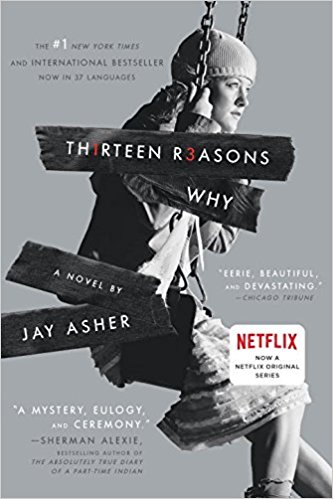When Will We Speak?
13 Reasons Why Prompts Censorship and Controversy

May 22, 2017
Mesa Ridge High School, Colorado Springs, has pulled the controversial book 13 Reasons Why by Jay Asher from circulation, but the ban only remained in effect for three hours until librarians protested on the basis of censorship. This action was prompted by the release of the Netflix series 13 Reasons Why, which brought a new wave of criticism. John Hickenlooper, our governor, has proposed the same action statewide after declaring teen suicide an epidemic. The rate of teen suicide has gone up concerningly, as Hickenlooper has already declared, and the question that usually proceeds such a statement is “why?” In spite of our never-before-seen quality of life and wealth, both nationally and regionally, to many teens the existential threat of suicide has never felt more present.
Will pulling the book out of circulation aid the issue of teen suicide? No, this will not address the roots of the issue; it will only cover up the ugly surface. It is censorship, and yes, bad ideas must be free from censorship also. It is merely regulating ideas, but not the thoughts that will continue to exist in students’ minds.
We have created a culture of silence, where suicide and depression are ignored, or even worse, fetishized. Where concern for your classmates’ mental health is considered taboo, and the conversation of suicide prevention is met with resistance.
In western society, we operate under the assumption that suicide is bad, which has its roots in Judeo-Christian values. In previous pagan religions, suicide was not considered morally wrong as Judaism, and later Catholicism, does. Although we do not consider it immoral anymore, but tragic, the fundamental concepts still remain: that it is shameful, an act of disrespect against life, and a societal ill. This differs from eastern cultures that view it as a mark of honor or dedication. I operate on the first assumption.
The main criticism against Asher’s novel is that it romanticizes suicide, that if you kill yourself you will be idolized afterwards and the people who did you wrong will learn their lesson. It also sends the message that Hannah’s suicide was not actually of her doing, but instead 13 other people’s fault. It diminishes Hannah of her own responsibility and concedes the control she has over her own life. If Hannah Baker’s death was really 13 other people’s doing, then why is it a suicide and not a homicide? The conclusion a child might reach by reading this book is that they are not responsible if they kill themselves for what others have done to them. Furthermore, Asher presents Hannah’s suicide as an inevitable end to the events that transgress throughout the tapes, but that is simply not the case. Suicide is not an inevitable conclusion.
Why do we give the word so much power? Suicide. Our silence only strengthens it. We fear speaking out against concerning behavior out of fear of rocking the boat. You are a snitch and uncool for showing concern for your classmates. You are a wet towel for criticizing the romanticization of self-harm and mental illness. When will it be enough? How many deaths will it take for us to realize that mental illness is not a fashion trend. It is an illness! Can we treat it like one?
But for some vocal narcissists who have formed their group identity on mental illness, society has reached the conclusion that mental illness is not so much an illness but an accepted part of life. We have forgotten those in the corner who suffer silently and instead on those who are the loudest. Untreated mental illness is not acceptable. Suicide is not acceptable.
If we continue to ignore the conversation, avoid to address the roots of the issue, we will forever be doing damage control. We are a generation that seeks constant external solutions to solve our internal issues, and when those external structures collapse, so does our self-esteem. We value the external more than internal: achievements versus integrity, popularity versus respectability. Our generation never learned how to help ourselves. We never learned personal responsibility or self-respect.
Speak for your classmates, speak for yourself. We are playing this great imitation game, dancing on a razor-thin edge between social acceptance and destruction. When can we speak for those in the corner who will not?


Dale sammons • May 27, 2017 at 9:57 pm
Outstanding article. Put a new perspective about the book and suicide.